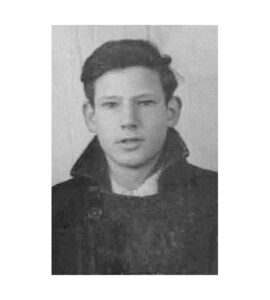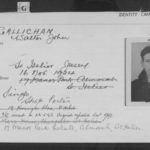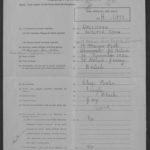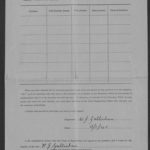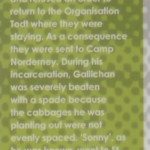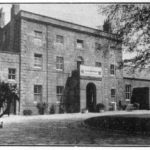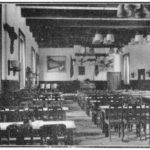Walter John Gallichan
- Date of Birth: November 16, 1924
- Date of Death: 1988
- Place of Birth: Jersey
- Date of Deportation: November 1943
- Address when Deported: 17 Manor Park Estate, Almorah, St Helier, Jersey
- Place of deportation: Jersey
- Sites deported to: Norderney,
By Gilly Carr
Walter John Gallichan was born in St Helier, Jersey, on 16 November 1924. He was thus 15 years old when the island was occupied in 1940. Gallichan had already left school and was working as a shop porter at this time, living at 19 Kensington Place in St Helier with his parents.
He comes to our attention because he was one of the very few islanders to spend time in a concentration camp in Alderney.
On 7 April 1943, his father (Walter Gallichan senior), a butcher, was tried by the court of Feldkommandantur 515 and given a one year sentence for failing to surrender a wireless set. He was tried with Francis Le Flock, who also appears on this website, and who was given an eight month sentence before being deported. Gallichan was allowed to serve his sentence in Jersey Prison on account of his ill-health. On 29 June 1943, the Attorney General made a successful application for Gallichan to be released on 15 July 1943 because of the state of the health of his wife and because he had seven children.
Given the financial impact to the family as a result of Gallichan’s imprisonment and ill-health, it is perhaps no coincidence that Walter Gallichan (junior) volunteered – or perhaps was sent – to work in Alderney as a civilian labourer for the Organisation Todt, along with another young Jerseyman, Gordon Prigent. The Jersey ‘guardian of memory’ for political prisoners, Joe Mière, recorded the stories of his fellow islanders about their own experiences of incarceration. Some of this information is presented at Jersey War Tunnels today. Interviews with Gordon Prigent also survive at Jersey Archives and the Imperial War Museum. From these sources, we learn that Gallichan and Prigent were sent to Alderney at the end of 1943 to work at the Organisation Todt farm (Mignot Farm); Gallichan would have just turned 19 years old. They were then sent to work at the Soldatenheim in the island (today the Island Hall), where they scrubbed the floors and worked in the kitchens. The pair were caught listening to the BBC news in a German officer’s office by a German nurse. They then refused an order to return to the Organisation Todt farm. As a consequence they were sent to Norderney Concentration Camp as a punishment. At this camp, Gallichan was beaten so hard across his back with a spade that the handle broke; the cabbages that he was planting out were not deemed to be evenly spaced. The young men were ill-treated, whipped, beaten and starved at Norderney.
After D-Day they were transported to Cherbourg for evacuation to Germany, but as the Americans had cut off the French peninsula, they were fortunately moved back to Alderney for a few more weeks. They were then packed tightly into the hold of a small vessel sailing to Guernsey, and then on to Jersey. It was now August 1944, and too late to send the prisoners on to St Malo as planned. Prigent and Gallichan were then released and allowed to go back to their homes, as long as they reported to the Feldkommandantur every day.
After the liberation, Gallichan was sent to St Saviour’s Hospital, an asylum. He was there for thirty years before Gordon Prigent found out what had happened to him. Prigent would visit him monthly, but found that Gallichan said he could hear voices. He’d sometimes talk to Prigent in German, or cry. Once, when Prigent took him into town, he stood to attention as if he was back in the camp and being given instructions. Prigent used to take Gallichan to Alderney, to prisoner reunions. In the 1980s, Walter Gallichan learned that he had not been sectioned and was actually free to leave St Saviour’s hospital. This must have been a severe relief as a former employee of the hospital has contacted the Frank Falla Archive to testify how she witnessed Gallichan regularly being cruelly taunted by some male nurses. As part of this, they falsely accused Gallichan’s mother of being a ‘Jerrybag’ (having relationships with German soldiers), and accused Gallichan of failing to fight the Germans, of ‘selling out’ Jersey to the Germans by working for them. They teased him by saying that the Germans were coming. Such behaviour towards a man with PTSD by the very people who were supposed to have cared for Gallichan is shocking and reprehensible.
After Gallichan was released, he lived in small flat in Castle Street, but was still plagued by the voices of ‘brute forces’ in his head.
Gallichan was not the only Islander to have spent his life in an institution for PTSD as a result of incarceration; Flavian Barbier and Walter Dauny were two other Jerseymen whose stories are told on this website who also had this experience, although symptoms of PTSD were common among all islanders who had been deported. One wonders how Barbier was treated in St Saviour’s hospital.
Walter Gallichan died in 1988. The Frank Falla Archive would like to welcome members of the Gallichan family to get in touch to share further stories, photos or documents about his life to supplement that which is shared here.
Sources
The Frank Falla Archive would like to publicly thank members of the Jersey public who came forwards in January 2019 to supplement the story above with what they knew of Walter Gallichan.
Walter Gallichan’s Occupation registration card, Jersey Archives ref. St/H/5/3132.
Walter Gallichan’s Occupation registration form, Jersey Archives ref. St/H/5/3133.
Jersey War Tunnels, information on display.
Bessenrodt, [Otto] Hauptmann Dr.: Der Insel Alderney, 2nd Edition, Deutsche Guernsey-Zeitung, Guernsey, February 1944.
Bunting, M. 1995. The Model Occupation. BCA for Harper Collins Publishers.
Sanders, P. 2005. The British Channel Islands under German Occupation 1940-1945. Jersey: Jersey Heritage Trust and Société Jersiaise.
Imperial War Museum, interview with Gordon Prigent 1989, reference 10711.
Map
- Cemetery / Mass Grave
- Concentration Camp
- Forced Labour Camp
- Prison
- Worksite / Fortification
